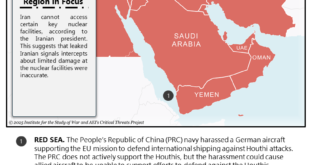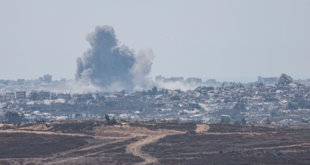 TEHRAN (FNA)- Iranian President Mahmoud Ahmadinejad on Wednesday refused to back down over his country’s nuclear program, stressing that Tehran may not give up even an iota of its rights.
TEHRAN (FNA)- Iranian President Mahmoud Ahmadinejad on Wednesday refused to back down over his country’s nuclear program, stressing that Tehran may not give up even an iota of its rights.
Iran will not trade its “dignity” in its nuclear program, Ahmadinejad said, in an apparent refusal to consider a main demand of world powers for the freeze of his country’s nuclear rights.
EU foreign policy chief Javier Solana will visit Tehran on Saturday and Sunday in an effort to persuade Iran to suspend its uranium enrichment activities, his spokeswoman said on Wednesday.
“They think they can trample on the Iranian nation’s dignity with such things,” Ahmadinejad said in a speech in the province of Chaharmahal and Bakhtiari, referring to incentive offers by the West.
“We will not trade our dignity with anything. If they want to give us something, then they should sell it and we will buy it.”
“The enemies are worried to see that the Iranian nation has preserved its dignity and become a model for other countries. They want to force the Iranians to back down,” Ahmadinejad continued.
“But the Iranian nation will leave them waiting for Iran to back down and the enemies will never reach this goal.”
In Brussels, Solana told a news briefing, “We hope very much there will be a positive outcome” from the meeting in Iran.
Asked what would constitute a “positive outcome,” Solana replied, “I think the meeting will not be the end. We will continue and have other meetings in the foreseeable future.
“It is very important that the nuclear issue is resolved in a manner that the international community will have objective guarantees of the nature of the nuclear program,” Solana added.
On Tuesday, Bush and European leaders warned Iran of new sanctions if it refuses to give up its right of nuclear enrichment, stipulated by the Non-Proliferation Treaty (NPT) as a given right of all signatories.
In an earlier speech, Ahmadinejad openly dismissed what he said was Bush’s desire for military action against Tehran, saying the US president could not hurt “even one centimeter” of the country.
“I tell Bush … that your era has ended and, thank God, you will not be able to damage even one centimeter of the holy land of Iran,” Ahmadinejad said in the city of Shahr-e Kord.
Washington and its Western allies accuse Iran of trying to develop nuclear weapons under the cover of a civilian nuclear program, while they have never presented any corroborative document to substantiate their allegations. Iran denies the charges and insists that its nuclear program is for peaceful purposes only.
Tehran stresses that the country has always pursued a civilian path to provide power to the growing number of Iranian population, whose fossil fuel would eventually run dry.
After Iran answered IAEA’s outstanding questions about the history of its past nuclear activities, Tehran said that it will only negotiate with the UN nuclear watchdog from then on. The Islamic Republic has also repeatedly stressed that it considers its nuclear case closed as it has come clean of IAEA’s questions and suspicions about its past nuclear activities.
Yet, the United States has remained at loggerheads with Iran over the independent and home-grown nature of Tehran’s nuclear technology, which gives the Islamic Republic the potential to turn into a world power and a role model for other third-world countries. Washington has laid much pressure on Iran to make it give up the most sensitive and advanced part of the technology, which is uranium enrichment, a process used for producing nuclear fuel for power plants.
As well as advocating tough diplomatic action, the United States has never ruled out a military strike against Tehran in the face of its refusal to heed Washington’s desire.
Speaking in Germany on Wednesday after talks with German Chancellor Angela Merkel, Bush said, “All options are on the table and my first choice is to solve this diplomatically.
“We’ll see what choice they make,” he said. “We’ll give diplomacy a chance to work.”
Several political officials in Berlin, including leading figures from Merkel’s own conservative party, said Bush, who steps down next January, would not be missed.
“The disaster after the war in Iraq caused serious damage to the image of the United States, and not just in Germany,” the foreign policy spokesman for the Christian Union’s parliamentary group, Eckart von Klaeden, said.
Ahmadinejad said Bush wanted to attack Iran but had been scared off by objections from military commanders.
“I have precise news that one of this man’s (Bush’s) wishes… is to strike us,” the president said.
“He argued with US military commanders to first use missiles and bombs. They told him it is not possible. Then he said ‘let’s make a sonic boom over an Iranian city’… but this also could not happen.”
Ahmadinejad said that Bush was still “itching to pinch and punch the Iranian nation.”
Washington’s push for additional UN penalties contradicts the recent report by 16 US intelligence bodies that endorsed the civilian nature of Iran’s programs. Following the US National Intelligence Estimate (NIE) and similar reports by the IAEA head – one in November and the other one in February – which praised Iran’s truthfulness about key aspects of its past nuclear activities and announced settlement of outstanding issues with Tehran, any effort to impose further sanctions on Iran seem to be completely irrational.
The February report by the UN nuclear watchdog, the International Atomic Energy Agency, praised Iran’s cooperation in clearing up all of the past questions over its nuclear program, vindicating Iran’s nuclear program and leaving no justification for any new UN sanctions.
Tehran says it wants to enrich uranium merely for civilian purposes, including generation of electricity, a claim substantiated by the NIE and IAEA reports.
Iran has also insisted that it would continue enriching uranium because it needs to provide fuel to a 300-megawatt light-water reactor it is building in the southwestern town of Darkhoveyn as well as its first nuclear power plant in the southern port city of Bushehr.
Not only Iranian officials, including President Mahmoud Ahmadinejad, but also many other world nations have called the UN Security Council pressure unjustified, especially in the wake of recent IAEA reports saying Iran had increased cooperation with the agency.
US President George W. Bush finished a tour of the Middle East in winter to gain the consensus of his Arab allies to unite against Iran.
But hosting officials of the regional nations dismissed Bush’s allegations, describing Tehran as a good friend of their countries.
Bush’s attempt to rally international pressure against Iran has lost steam due to the growing international vigilance, specially following the latest IAEA and US intelligence reports.
 Eurasia Press & News
Eurasia Press & News


